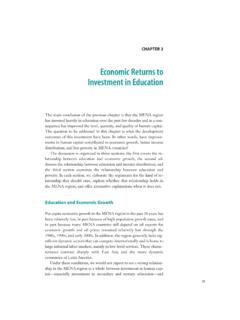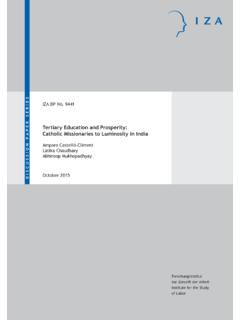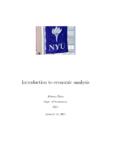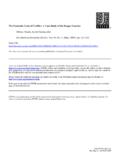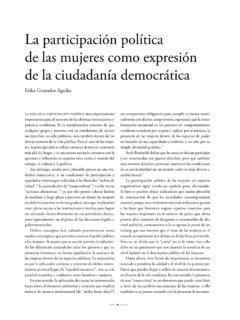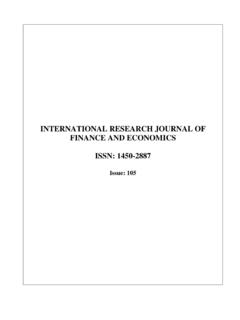Transcription of Bureaucracy is constraining democracy in South …
1 Bureaucracy is constraining democracy in South African schoolsMARIUS SMITL ecturer, Faculty of Education, North- West Province University1 INTRODUCTIONF ollowing the first democratic election in 1994 and the establishment of a constitutional democracy ,1 South African society has been undergoing a fun-damental transformation. In education, democratisation has been formalised with the redistribution and extension of power to local school governing bodies with the removal of centralised control over certain aspects of edu-cational The directive principle in section 4(m) of the National Education Policy Act3 contains the democratic requirement that the national Minister of Education must ensure broad public participation in the development of the education by including stakeholders in policymaking and governance in the education South African Schools Act5 (hereafter the Schools Act )
2 Gave formal effect to the establishment of democratic structures of school governance which provide the basis for co-operative governance between education authorities and the school In principle these provisions were intended to establish a democratic power sharing and co-operative partner-ship among the state, parents, and In terms of section 20 of the Schools Act,8 the authority of school governing bodies inter alia include the functions to: recommend the appointment of staff, determine the language policy of a school, take measures to ensure learner discipline at schools, and the responsibility for control of the school s property and financial De Waal Currie J, Currie I The new Constitutional and Administrative 1 ed Juta (2001) Oosthuizen IJ, Rossouw JP Fundamentals of Education Law (2003) Potchestroom: Azarel Publishers National Education Act 27 of 1996 at s 4m.
3 4 South African Schools Act 84 of Squelch JM The establishment of new democratic school governing bodies: co-operation or coercion in De Groof J, Brag E, Mothana S, Malherber R, Power sharing in Education: Dilemmas and implica-tion for schools Leuven; Acco (1998) 101. 7 Karlsson J Partnerships in current education and practice in Groof (fn 6 above) South African Schools Act (fn 5 above) s , democracy & DEVELOPMENTThe transformation of the South African Education system has brought a spectrum of dilemmas regarding schools and democracy to light. According to Hilliard & Notshulwana,9 it became evident after the transformation of the education system that there is still a lack of enlightened understanding of the essential tenets of democracy .
4 They state that democracy can take decades to evolve and is complicated by the fact that, prior to 1994, South Africa had never experienced a democratic The different views of democracy are evident from the disagreements with regard to equal access to schools, transformation policies, public funding, inadequate stakeholder participation, public accountability and limitations on fundamental rights within the school focal point of these disputes has tended to be at the meso-level of the education system, between Provincial Education Departments on the one hand, and schools, parents or educators on the democracy V BUROCRACY IN South AFRICAN BackgroundSince the decentralisation of school governance in South Africa in 1996, a number of bureaucratic actions and incorrect administrative decisions by education administrators have lead to legal disputes that indicate a disregard for, or misunderstanding of the democratic values and principles that are necessary to promote effectiveness and efficiency in education.
5 As in other countries, the major political and legal conflicts in public education have centred on questions of educational governance, processes and educators, and on the goals and benefits of instance, the failure by education authorities to support school govern-ing bodies recommendations to expel ill-disciplined learners demonstrates an officious reluctance to take decisive action in the interest of good school The unilateral appointment of educators contrary to school governing bodies recommendations and legislative amendments exposes the intentional programme of provincial education authorities to re-central-ise control and power in key issues in Legal disputes over the imposition of language policies by education authorities in contravention of the rights of school governing bodies indicate a bureaucratic disregard 9 Hillard VG.
6 Notshulwana M Strategies for ensuring sustainable democracy in South Africa (2001) Acta Academica Hillard 151 (fn 9 above).11 Harman G democracy , Bureaucracy and the politics of education as in Chapman, JS and Dustan JF democracy and Bureaucracy - tensions in public schooling (1990) New York Press Visser PJ Failure by head of Education Department to act timorously and to interpret the law correctly- Maritzburg College v Dlamini, Mafa and Kondza case no 2089/2004 (as yet unreported) (2005) Journal for Contemporary Roman-Dutch Law Beckman J Aligning school governance and the law: Hans Visser on education cases and policy. A memorial lecture read in memory of the late Prof Visser on 27 July 2007 at the University of Pretoria IS constraining DEMOCRACYfor minority languages Before the advent of democracy in 1994, Lardeyret15 warned that the prospects for sustainable democracy in South Africa are grim, if an effectively strong opposition and other mechanisms are not enhanced in order to ensure that accountability of public functionaries is exacted and the essential principles of democracy are adhered to by all.
7 Since attaining democracy , the African National Congress (ANC) has consistently received overwhelming support in national As a result the ANC has established an unassailable position as ruling political party in South Africa. Commentators have suggested that in reality, South Africa is a de facto one party this context, the controversial actions and decisions of the bureaucracy17 raises the concern that democracy in education is being constrained, and as a result, that the efficiency and optimal effectiveness of the education system is being democracy in EducationCunningham18 explains that although the word democracy commonly invokes different conceptions, the shared core principles of liberal democracy include the notions of governance by the people, either directly through participation and deliberation, or indirectly through accountable and responsive represent-atives fairly by majority vote.
8 Furthermore, democracy entails state protection of fundamental political and civil rights in terms of the rule of law and that the power of democratic institutions and pluralist interests are controlled by checks and balances and the separation of government The South African Constitution20 comprises an integrated model of liberal democracy that provides for indirect representative democracy , pluralist checks and bal-ances, enshrinement of fundamental rights, as well as direct deliberative and participatory controls, procedures and Malherber EF The constitutional framework for pursuing equal opportunities in education (2004) Perspectives in Education Lardeyert G The problem[me] with PR (In: the global resurgence of democracy ) (1993) Diamond & Partner Baltimore: John Hopkins University Press ANC attained a majority of 68,8% in the 2005 general election.
9 See / 24 (accessed on 25-10-2007). 17 In her book Bureaucracy and democracy Etzioni-Halevy (1983) 85 defines Bureaucracy as a hier-archical organization of officials appointed to carry out certain public objectives. She concludes that although bureaucracies have not become more powerful than politicians, bureaucrats in most modern states have become sufficiently powerful to pose a threat to democracy by means of the abil-ity to allocate resources, influence outcomes by administrative decision-making and by controlling positions of power. 18 Cunningham F Theories of democracy - a critical introduction Oxford and New York: Routlege (2002) Aspin DN The conception of democracy : A philosophy for democratic education as in Chapman J, Froumin I and Aspin DN London New York Press (1995) Constitution of the Republic of South Africa Act, De Waal J (fn 1 above) , democracy & DEVELOPMENTP articipatory democrats have argued that more participation leads to increased effectiveness22 and should be encouraged.
10 Pateman,23 Held24 and Gould25 in particular, have proposed ways to democratise workplaces, the family, media, neighbourhoods, universities, schools, and decision-making about human relations to the natural environment. There are numerous modes of participation in the public education sphere including voting, campaigning, group activity, contacting representatives and officials, protesting, attending meetings, petitioning, fund-raising, canvassing and defined, deliberative democracy refers to the notion that legitimate political decision-making emanates from the public deliberation of citizens. In other words, as a normative account of political decision-mak-ing, deliberative democracy evokes ideals of rational legislation, participatory politics and civic Habermas28contends that the centrepiece of deliberative politics consists of a network of discourse and bargaining (compromising) that facilitates the rational solution of pragmatic, moral and ethical questions.










